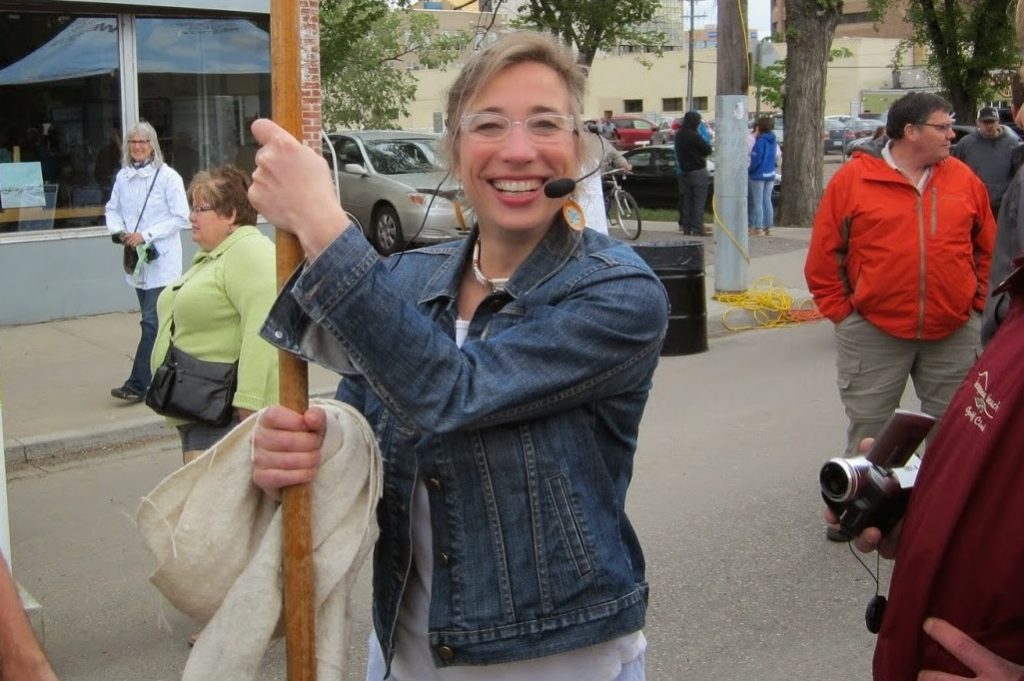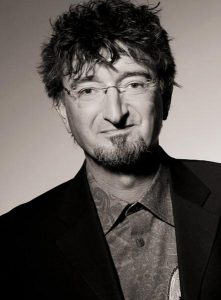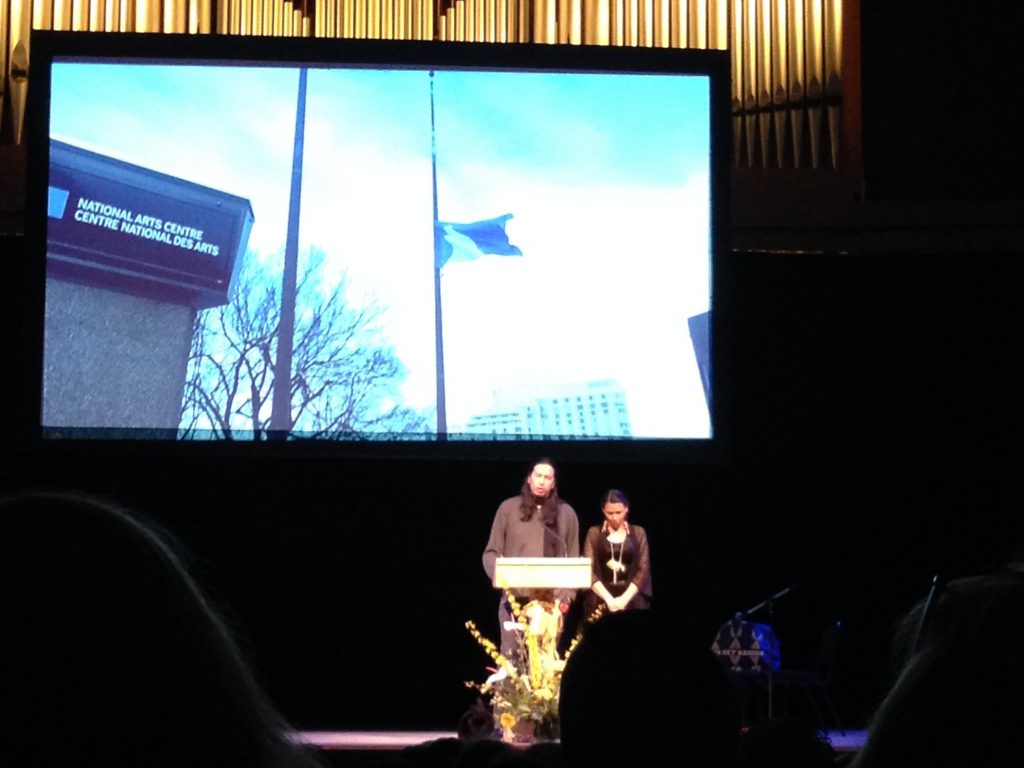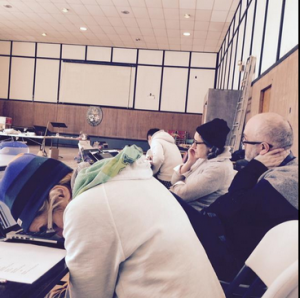Jess Thom, February 2015
Introduction
Hello I’m Jess. I’m a writer, artist and part time superhero. I also have Tourettes Syndrome; a neurological condition that means I make involuntary noises and movements called tics.
There are three things you need to know straight away:
- Firstly, you’re going to hear the word “Biscuit” a lot in the next half hour.
- Secondly, several times a day I completely lose control of my body and speech. These episodes, which I call ticcing fits, look seizure-like and need similar management. If this happens while I’m speaking my support worker will help me and Sarah and Alex will take over.
- Finally, if I say something funny you’re absolutely allowed to laugh, in fact it’ll be a bit weird if you don’t.
This is my first time in Canada and although we have a language in common I’m learning that not all our words mean the same thing. So to help bridge this cultural divide, whenever you hear me saying “Biscuit” I’d like you all to think “cookie”.
Self-Description
I’m going to give a brief description of myself for anyone who might find this useful: I’m a thirty-something white woman of average build with curly hair and a very cool wheelchair.
Having Tourettes gives me a wiggly body that’s constantly on the move. My most frequent tic involves punching myself in the chest; it’s happening now, and now, and now! But don’t worry; I’m wearing padded gloves to stop me getting sore.
All the slides I’ll be showing – with the exception of five that I’ll describe in more detail when I get to them – are colourful hand-drawn cards with the title of the section on them.
The Republic of Inclusion
When I was asked to come and speak at this event I got really excited, not just at the prospect of coming to Toronto, but mainly because the idea of a “Republic of Inclusion” caught my imagination.
A republic is a form of government in which the power resides with the people, so it feels entirely appropriate in relation to inclusion because I believe the power of inclusivity resides within us all.
Legislation, resources and expertise all have important roles to play, but to build sustainable, inclusive communities, we all need to be ready to think, talk, and take action together.
As you can probably tell by now, having Tourettes means I’m rarely still or quiet. My tics go everywhere I do, and they’re often the first thing people notice about me.
I’ve had tics since I was six but they were less noticeable when I was a child. In my early twenties they began to intensify and have a bigger impact on my life.
I’ve had to move house and start using a wheelchair to stay safe.
Tics can turn ordinary tasks, like making a cup of tea or pouring maple syrup, into extreme sports, but they affect me in much subtler ways too.
As a teenager I used to love going to the theatre, but the more my unusual noises and movements made me stand out, the harder I found it to go.
And I’m not alone in this. When I started work on my first show Backstage In Biscuit Land I Googled ‘Tourettes Theatre’. Nearly all the top results were accounts of people with Tourettes being asked to leave theatres or sit elsewhere because of their condition.
I’d like to share with you a monologue from Biscuit Land. It describes the experience that started my journey to being here with you now. Here it is:
I’d heard Mark Thomas was doing a show called Extreme Rambling at the Tricycle Theatre. Loads of friends had talked about it so I was really keen to see it.
At that point I hadn’t been to the theatre for several years and I’d had some upsetting conversations about my right to see stuff over other people’s right not to be interrupted.
But it felt right to see Extreme Rambling because it was about something I was interested in – Mark Thomas walking the Palestinian separation barrier.
Loads of thought and planning went into our trip. I got in touch with Mark by email, I spoke to the theatre, and I went with two people I know very well, Matthew, aka Leftwing Idiot, and Poppy.
We met Mark beforehand so he had a chance to hear my tics and see what they were like. I sat towards the back so I could get out easily if I needed to. I was still walking at the time but was very wobbly and needed help.
At the start of the show Mark introduced me and let the audience know I’d be making noise. The first half was fantastic and completely absorbing.
Then in the interval the front of house manager came and said, “You don’t have to move, but we’ve had some complaints about the noises you’ve been making and people are threatening not to come back unless you move, so you know, would you move to the sound booth at the side of the stage?”
He was careful to point out I didn’t have to, but at that point I felt if people are complaining about me they don’t want me here. I knew I wouldn’t be able to concentrate because I’d know I was unwelcome and being judged. I felt like the only option, having had that conversation, was to move. So Poppy, Leftwing Idiot and I got up.
We were taken backstage through a narrow corridor to the sound booth. Mark was getting ready to do the second half and was clearly uncomfortable with what was happening.
The booth was behind glass. Because it was visible from the stalls it had slatted blinds like the type you get in offices.
I could see Leftwing Idiot was really tense. We’d paid for the tickets and the view…well we couldn’t really see what was happening.
We were surrounded by equipment and I thought, ‘Oh God, I could really muck things up if I press anything!’
The sound technician, who must’ve seen the show a hundred times, was doing a crossword. She moved up and we sat on an assortment of computer chairs.
I was gutted. We were watching a show about segregation, about separation, and I wasn’t welcome to watch it with other people.
The show started again and I sobbed. I absolutely sobbed.
I couldn’t concentrate on what Mark was saying because I felt utterly, utterly humiliated, embarrassed and alone.
I wanted to leave straight away and never come back. It felt like an experience I could not or should not access because it was damaging to me.
It didn’t just speak about the theatre – it was about everything like, “You don’t have the right to be in public space in the same way as anyone else – your experiences can only happen if they don’t impact on other people’s.”
Later that evening I looked on Twitter, and found a really nasty Tweet by a woman who’d been there.
“Went to political comedy thing tonight, might have learnt something but for Tourettes person shouting, Fuck you, Merry Christmas.”
While I sat sobbing in that sound booth I promised myself I’d never set foot in another theatre again. Thankfully, this wasn’t a promise I kept.
I’m much more confident at asserting myself now, but the intensity of that moment is permanently etched into my memory.
The last talk on inclusion I was asked to give didn’t go well. In fact it didn’t go at all. I arrived at the venue to find six steps between me and the room I was due to present in.
I thought about giving the talk from the bottom of the stairs and calling it six steps to inclusion. But I chose instead to say I’d return when they could provide an accessible venue.
Ironically, when I started thinking about the ideas I wanted to share today I found there were six of them!
So unless anyone’s got a spare ramp, here are my six steps to inclusion.
Step One: The Power of Creativity
I’ve always considered myself to be a creative person. I studied drawing as an undergraduate and completed a Masters Degree in photography. Throughout my artistic education I was also interested in playful participatory events for children and young people.
But it’s through my experiences of Tourettes that I’ve become truly aware of the power of creativity; both the impact it has on individual wellbeing and the role it plays in creating social change.
Touretteshero’s a non-profit, and a secret superhero persona, and since its birth in 2010 it’s evolved in ways I could never have imagined.
We use creativity and humour to increase the understanding of Tourettes with as wide an audience as possible.
We do this:
- Online, through Touretteshero.com and on social media
- Through creative encounters with artists, musicians, scientists, academics and partner organisations
- By speaking out about the impact of damaging political policies
- And by delivering inclusive creative events for children
Touretteshero is for everyone, with and without tics. Our mission is to ‘Change the world one tic at a time.’
We do this to:
- Reclaim the laughter associated with Tourettes
- Challenge myths, stereotypes and assumptions about the condition, and about disability more generally
- And reduce the fear around disability and help people feel more comfortable talking about it
Disability isn’t a niche issue; if you’ve got a body or a mind you can become disabled at any point in your life.
Thinking about what this might mean can make life easier to manage if your circumstances change.
Touretteshero began with a conversation that radically changed the way I view my condition.
My friend Matthew described my tics as, “A crazy language-generating machine”, and told me not doing something creative with them would be wasteful.
This idea took root and was how I came to see my tics as my power, not my problem. Tics let me do things neuro-typical people can’t do like colliding words together to create incredible new ideas.
Without my unusual neurology we wouldn’t have the joy of:
‘Disco penguins dancing in your dreams.’
The ‘Hans Solo Centre for Masturbation Excellence.’
Or the ‘Canadian Peacekeeping Panda Force.’
Through Touretteshero I’ve re-cast the symptoms of my condition as springboards for creativity. I share my tics online and invite people to make artwork in response. Here are a few of my favourites:
Capital letters talk to themselves at night – The letter A and the letter B fast asleep under a patterned bedspread.
95% of biscuits are birds – A boy in a stripy shirt is about to eat a tiny bird he’s selected from a cookie box full of other birds
Stuff my mouth with pencils – A line drawing on graph paper showing a man with over 60 red pencils in his mouth
Squishy squirrel love – A cartoon squirrel hugs a large pink bottom
Alien Barbados Donkey Training Company – A black and white circular logo with an alien-eyed donkey head at the centre and a tiny map of Barbados on the right
Before Touretteshero I found it hard to talk about Tourettes without tears. Recognising the creative potential of tics and developing the language and confidence to articulate my experiences has had a more powerful impact than any medical treatment.
Step Two: Making Theatre Inclusive Makes It Better
The second idea I’d like to propose is that making theatre inclusive makes it better.
Theatre that takes an inclusive approach leads to stronger, more dynamic work. Unexpected and amazing things can happen at performances where everyone’s welcome. Whose life wouldn’t be enriched by seeing an ASL interpreter being asked to sign that she was sawing her own tits off?
There’s a growing movement within British theatre for ‘relaxed performances.’ This is a way to describe performances that welcome people who might find it difficult to follow the usual conventions of theatre etiquette.
Performers take a relaxed approach to noise coming from the audience, and lighting and sound are sometimes adjusted slightly to take account of sensory sensitivities.
Relaxed performances are a relatively new concept and have, until recently, tended to focus on children’s shows. I’m proud that Backstage In Biscuit Land is playing a part in spreading awareness of this concept to adult audiences too.
Last December I saw the first ever relaxed performance at the Tricycle, the theatre where I’d had such a hard time previously.
Relaxed performances allow me to enjoy a show without worrying about other people’s reactions to my tics.
But the brilliant thing is that everyone can benefit from being at a relaxed performance. When they’re done right they give the whole audience permission to relax, move about, and make noises if they want to. This fosters a more exciting theatrical experience and even the most non-disabled theatregoers can benefit.
For this reason I’ve started using the term Extra Live to describe Backstage in Biscuit Land – partly because it’s playful and sounds intriguing and partly to convey the added benefit a relaxed performance offers us all.
While lots of theatre practitioners are clearly excited by the concept of relaxed performances, some remain apprehensive. Here are three of the most common concerns, with my responses.
1) ‘I’m worried that if I do a relaxed performance some audience members might be put off, and the show won’t sell as well.’
It’s important to explain what a relaxed performance is, and to frame it positively. Performers and audience members benefit from the invitation to relax, and the more people who experience it the less likely this is to be a problem.
2) ‘If someone’s making noises or moving about, will it distract me from the performance?’
Most people edit out background noise all the time, particularly when they know why it’s happening. If the performance is holding your attention, experience tells me you won’t get distracted.
It often turns out that people who express this concern have never been to a relaxed performance at all; they’ve just assumed they’ll be distracted!
Conversely, people who’ve actually been to one often say the relaxed environment has enhanced their experience of the piece.
3) ‘What if I do a relaxed performance and no one who needs it turns up?’
It doesn’t matter!
Firstly, the reason why someone wants to go to a relaxed performance won’t always be obvious, nor should it have to be.
Secondly, just by having a relaxed performance you’re exposing more people to the concept.
Remember, someone in the audience might think ‘Wow, my friend would’ve felt really welcome at that show.’
Theatre is joyous because it’s live and it takes us on a journey together. When we see a show we choose to share that experience with other people and we don’t want to be alone in the room. Likewise, there would be no pleasure for actors performing to an empty house.
So my question for directors, producers and performers who’re sceptical about relaxed performances is, ‘Are you willing to list the people who aren’t welcome to be part of your audience?’
It’s an uncomfortable question, but being quietly excluded is an uncomfortable experience.
There’s so much amazing theatre out there and I don’t want anyone to miss out because of preconceptions about who it’s for or how it should be enjoyed.
Step Three: I’m Not Disabled By My Body
I’d like to talk briefly about models of disability. By this I don’t mean crutches made out of matchsticks, papier-mâché wheelchairs or balsawood assistance dogs!
I mean the concepts we use to think about it.
For a long time the way people thought about disability followed a ‘medical model’. This sees a person as being disabled because their body or mind is impaired in some way. It focuses on what’s wrong with the person and not what the person needs.
The ‘social model’ says disability is caused by the way society is organised.
For example, if I can’t get into a building because of say, six steps, the medical model would say the problem is my wobbly legs. In contrast, the social model identifies the steps as the disabling factor. Ramp anyone?
People are often nervous about calling me disabled because they view it negatively. I don’t see it that way at all. For me, saying I’m disabled acknowledges the barriers I face because of our collective failure to consider difference. And if these barriers are acknowledged, they can be changed.
Understanding my life in this context has raised my confidence and expectations and, most importantly, it’s enabled me to participate in finding solutions.
Step 4: The Damage of Diminished Expectations
While Touretteshero was inspired by a single sentence, countless experiences have informed and shaped it.
One such moment happened at a conference years ago when I met a man with Tourettes whose tics were barely noticeable. The cumulative effect of the negative reactions he’d experienced growing up seemed to have severely impacted on his confidence. He’d learnt to expect that other people would respond negatively towards him, and this expectation seemed to be restricting his life in adulthood.
I’d argue that damage to confidence is always harder to undo than it is to prevent. At Touretteshero’s heart is the idea that strengthening the confidence and resilience of disabled people, particularly children, has the potential to create significant social change. Here’s the formula:
Confident children = confident adults = undiminished expectations = more inclusive communities
We focus on inclusive events because creating positive memories means children, and young people have positive experiences to draw on when things feel tough.
Step 5: Creating Change Isn’t Always A Battle
I used to think attitude change was a long-drawn-out process. Touretteshero’s taught me that it can be very quick, and it often starts with a single conversation.
The following twitter exchange perfectly illustrates this. Before I read it I should point out that my tics make me unusually easy to identify on social media, so when people think they’re talking about me anonymously, they’re not!
This exchange took place on a journey from London to Manchester:
@Abi_Macc: On train with genuine Tourettes person in same carriage. Everyone around nobly studious in their scrutiny of on-board reading material.
@Abi_Macc again: Have solemnly promised not to swear on Twitter so here’s the edited highlights: ‘Biscuit’, ‘I’m a baby’, ‘Donkey’. What an affliction.
Me: It’s also a gift. Check out my dailyoutburst for more.
@Abi_Macc: Thanks I will check it out! Not sure if I was quoting you – train to Manchester. If I was hope no offence caused or taken.
Me: None at all. See what happens when the tics come to life.
@Abi_Macc: This is amazing. Not affliction, creativity – do you mind if we live remix your video into one-day installation at playspace on identity?
Creating change doesn’t always have to be a battle; it can be joyful, persuasive, discursive and silly. If we can get people to engage we can get them to change.
Step 6: Laughter as a Catalyst for Change
Tourettes can be very funny. When we started Touretteshero, this felt like a risky thing to say. We had no idea how people were going to respond to our invitation to share the humour of the condition. Of course Tourettes isn’t funny in itself, but my tics often are – in a way that the conscious part of me can only dream of!
Lots of the situations I find myself in are funny too, like when I become an involuntary GPS while my friends are playing Mario Kart, or when I’m explaining to airport security that there isn’t actually a bomb in my bag.
The difference between laughing at someone or with them is well understood. But people sometimes say this is a blurred line; personally I don’t experience it that way at all. I can’t think of a single occasion when I wasn’t completely sure whether someone was laughing at me, or enjoying the humour of a situation with me.
But fear of crossing this line, of causing offence, of being ridiculed, or trivialising disability can put people off utilising one of the most powerful ways to connect with other people.
Reclaiming the laughter surrounding difference and choosing how to share it is an act of resistance and a catalyst for change.
Ideas To Leave You With
So those are my six steps. But I’m not quite done. I’d like to leave you with four very quick thoughts before concluding.
1) The Realm of Imagination
It’s all too easy to overlook the realm of the imagination, but don’t underestimate the potential of this space to unlock new ways of thinking and engaging with other people.
2) Nurturing Unpredictable Outcomes
Some of the most exciting aspects of Touretteshero’s evolution were unplanned. Being open to the unexpected and not having fixed ideas can lead to incredible outcomes.
3) Mind Your Language
How we talk about disability matters. Language guides us through different ways of thinking. Don’t feel you have to settle for other people’s definitions if you don’t feel comfortable with them. Think reflectively about language, and question how you use it yourself.
4) Reducing fear
Fear creates barriers and there’s a lot of fear surrounding disability: fear of difference, fear of saying the wrong thing, fear of being hurt by others.
Don’t let fear get in the way, talk to people, challenge assumptions, and be ready to overcome your own fears.
Conclusion
The main thing I’ve learnt in the five years spent running Touretteshero is that if something isn’t working I have the capacity to change it. This isn’t because of my super powers, it’s because we all have the ability to create change. Realising this and acting on it is a significant step towards building more inclusive communities.
Whenever you’re thinking about the barriers you want to bring down, it’s worth thinking about what you want to create, develop and protect at the same time.
Whatever change you want to engender, be ready to talk, listen, laugh, question and imagine. And let all of this inform your actions.
Changing the world isn’t too mighty an ambition, and it’s definitely not just the domain of politicians or people wearing capes. It’s something everyone can do.
Thank you.




















